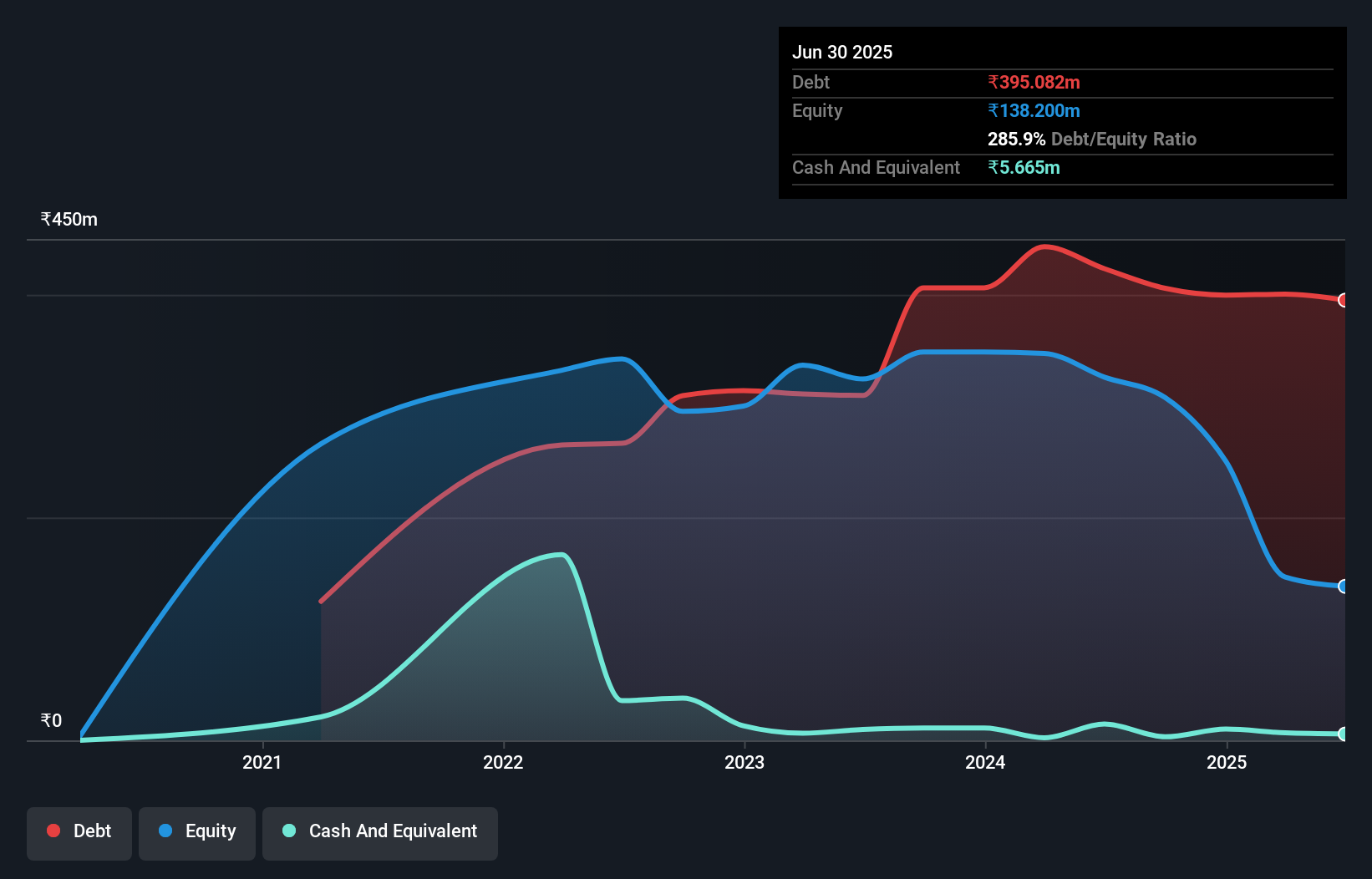Is Vineet Laboratories (NSE:VINEETLAB) Using Too Much Debt?
Legendary fund manager Li Lu (who Charlie Munger backed) once said, 'The biggest investment risk is not the volatility of prices, but whether you will suffer a permanent loss of capital.' It's only natural to consider a company's balance sheet when you examine how risky it is, since debt is often involved when a business collapses. We can see that Vineet Laboratories Limited (NSE:VINEETLAB) does use debt in its business. But is this debt a concern to shareholders?
When Is Debt Dangerous?
Debt and other liabilities become risky for a business when it cannot easily fulfill those obligations, either with free cash flow or by raising capital at an attractive price. Part and parcel of capitalism is the process of 'creative destruction' where failed businesses are mercilessly liquidated by their bankers. However, a more common (but still painful) scenario is that it has to raise new equity capital at a low price, thus permanently diluting shareholders. Of course, plenty of companies use debt to fund growth, without any negative consequences. The first thing to do when considering how much debt a business uses is to look at its cash and debt together.
What Is Vineet Laboratories's Net Debt?
The image below, which you can click on for greater detail, shows that Vineet Laboratories had debt of ₹395.1m at the end of June 2025, a reduction from ₹423.4m over a year. Net debt is about the same, since the it doesn't have much cash.

How Strong Is Vineet Laboratories' Balance Sheet?
We can see from the most recent balance sheet that Vineet Laboratories had liabilities of ₹681.3m falling due within a year, and liabilities of ₹66.0m due beyond that. Offsetting this, it had ₹5.67m in cash and ₹82.6m in receivables that were due within 12 months. So it has liabilities totalling ₹659.0m more than its cash and near-term receivables, combined.
This deficit casts a shadow over the ₹314.9m company, like a colossus towering over mere mortals. So we'd watch its balance sheet closely, without a doubt. At the end of the day, Vineet Laboratories would probably need a major re-capitalization if its creditors were to demand repayment. There's no doubt that we learn most about debt from the balance sheet. But you can't view debt in total isolation; since Vineet Laboratories will need earnings to service that debt. So when considering debt, it's definitely worth looking at the earnings trend. Click here for an interactive snapshot.
See our latest analysis for Vineet Laboratories
In the last year Vineet Laboratories had a loss before interest and tax, and actually shrunk its revenue by 56%, to ₹602m. To be frank that doesn't bode well.
Caveat Emptor
Not only did Vineet Laboratories's revenue slip over the last twelve months, but it also produced negative earnings before interest and tax (EBIT). Its EBIT loss was a whopping ₹161m. When we look at that alongside the significant liabilities, we're not particularly confident about the company. We'd want to see some strong near-term improvements before getting too interested in the stock. It's fair to say the loss of ₹189m didn't encourage us either; we'd like to see a profit. In the meantime, we consider the stock to be risky. When analysing debt levels, the balance sheet is the obvious place to start. But ultimately, every company can contain risks that exist outside of the balance sheet. For example Vineet Laboratories has 3 warning signs (and 2 which are a bit concerning) we think you should know about.
If you're interested in investing in businesses that can grow profits without the burden of debt, then check out this free list of growing businesses that have net cash on the balance sheet.
New: Manage All Your Stock Portfolios in One Place
We've created the ultimate portfolio companion for stock investors, and it's free.
• Connect an unlimited number of Portfolios and see your total in one currency
• Be alerted to new Warning Signs or Risks via email or mobile
• Track the Fair Value of your stocks
Have feedback on this article? Concerned about the content? Get in touch with us directly. Alternatively, email editorial-team (at) simplywallst.com.
This article by Simply Wall St is general in nature. We provide commentary based on historical data and analyst forecasts only using an unbiased methodology and our articles are not intended to be financial advice. It does not constitute a recommendation to buy or sell any stock, and does not take account of your objectives, or your financial situation. We aim to bring you long-term focused analysis driven by fundamental data. Note that our analysis may not factor in the latest price-sensitive company announcements or qualitative material. Simply Wall St has no position in any stocks mentioned.
About NSEI:VINEETLAB
Vineet Laboratories
Engages in the research, development, manufacture, and sale of active pharmaceutical ingredients (API), intermediates, and fine chemicals primarily in India.
Fair value with mediocre balance sheet.
Market Insights
Community Narratives



